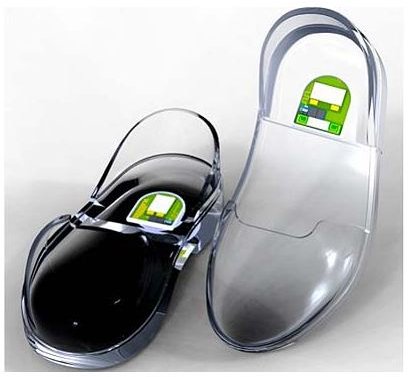Do GPS Shoes Violate Your Privacy or Keep you Safe? The Pros and Cons of GPS Sneakers
How They Work
GPS sneakers utilize a Bluetooth or trans-receiver device in each shoe for tracking purposes. The person wearing the shoes can be monitored through a relay station that transmits through a cellular network. Depending on the model purchased, friends or loved ones can keep an eye on the individual wearing the GPS shoes and see their location through a cell phone, a website or receive text alerts.
The Pros

These types of shoes would be a great benefit to children, Alzheimer’s patients or other individuals with debilitating mental diseases. The “Ambulator” GPS shoe will have an option of setting up a “geo-fence”, which could let family members know if their loved one has traveled out of a particular area. This could give those who are concerned about their safety peace of mind by knowing their location at all times. Individuals wearing them do not have to know they are wearing a tracking device, giving them a sense of independence. The “Ambulator” (which will be available in 2011) will allow friend/family members to get this detailed information through a website or by text alerts.
Others can use the GPS shoes for hiking or traveling. The “Blue GPS Shoe” (created by Isaac Daniels) will have a security feature built into them that will allow users wearing them to signal for help. When activated, the shoes work with the individual’s cell phone by adding a link to up to five emergency contacts. By using quantum satellite technology and ID Conex (a monitoring service) a person can be found within a yards distance. The emergency contact or authorities could then take action to find and assist the person signaling for help.
The Cons
The big issue is invasion of privacy. There is a concern that unauthorized people can get access to individuals being monitored through the GPS shoes. Other individuals will simply not like to be GPS tracked. The ID Conex service that the Blue GPS shoe uses not only keeps track of an individual’s location for emergency situations, but also has an option to post this information on the Facebook website.
The idea of having a shoe GPS device depends on the individual wearing them. A person keeping track of an individual will not be able to see where they are if they are not put on. Since GPS requires a source of power to function, the batteries they will use will need to be recharged frequently.
Another concern with GPS sneakers are cost. The “Blue GPS” shoes (which has yet to be released) is estimated to cost about $350 per pair, along with a tracking service of about $20 a month. The “Ambulator” (created by the GPX Corporation and Aetrex Worldwide) will cost between $200-300 with a monthly monitoring fee of $18-20 dollars.
Final Thoughts
When considering the pros and cons of GPS shoes, it boils down to an individual’s personal needs. For Alzheimer patients, this product may be worth purchasing. However, the thought of an invasion of privacy by someone who may try to take advantage of this technology can be a bit unsettling.
References
- Isaac Daniel company website
- GPS Shoe.com
- Inter Dynamic Group website - “The Blue GPS Shoe”
- Aging In Place Technology Watch -Industry Trends, Research and Analysis
